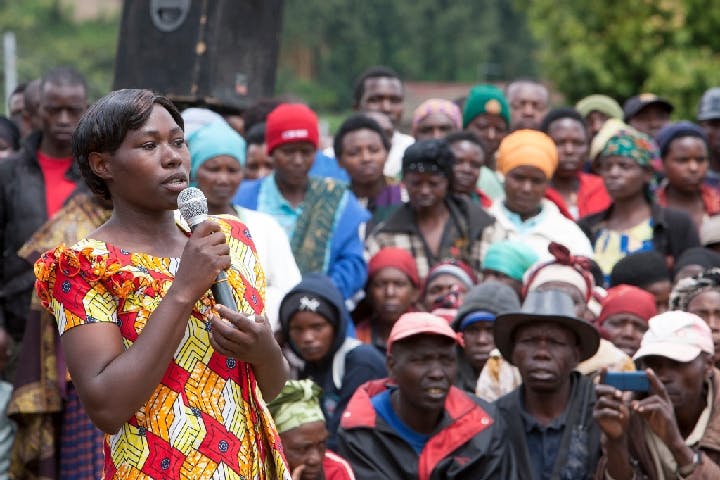Rwanda’s overlooked lessons on gender equality
– Miriam Kelberg
Caregiving and domestic work are often treated as responsibilities exclusively for women. Can traditional, patriarchal communities accept that masculinity can coexist with care work?
What do we mean when we talk about “caregiving”?
In the United States, the term can conjure thoughts of looking after a loved one who is ill — a son or daughter home sick from school, or an elderly parent who struggles to live independently. But “care” can be extended to mean much more: care of loved ones, yes, but also household work or voluntary aid of others in the community.
“Care is a social good,” write Deepta Chopra and Caroline Sweetman in Gender & Development. “It not only sustains and reproduces society, but also underpins all development progress.” Yet despite its central importance in every culture, “the vast majority of care work is done for free, at home,” where it is “widely seen as a female responsibility.”
The participation of women in public life, politics, and business is growing phenomenally throughout the world, but perhaps nowhere has this transition been more profound or rapid as in Rwanda. After the 1994 Rwandan genocide, women took on leading roles in the reconstruction of both the economy and the social fabric of their nation. In the electoral realm, minimum gender quotas were introduced for the national legislature — a major reason why Rwanda now has the most heavily female government in the world, with women comprising 64 percent of the country’s national parliament.
While the public roles of Rwandan women have changed rapidly, new research shows that the progress has been slower in private life. Kate Doyle and a team of her colleagues found that on average, men in Rwanda spend one-third as much time as their female counterparts performing household tasks, like cooking or fetching water. As a result, women are left with substantially less time and opportunity to balance domestic duties with paid work outside the home. Combining the amount of time spent on unpaid care work and outside-the-home paid work, the average Rwandan woman works 11 hours more each week than the average Rwandan man.
Organizations like MenCare+, RWAMREC, and the Rwandan Ministry of Health are working to redistribute the burden of care work and help men learn new ways to constructively contribute in the household — involvement that dissuades unequal power and physical violence, and instead cultivates healthy emotional connections. At least 48 classes on fatherhood are currently in session across Rwanda, and more than 600 men and their partners have already participated in similar group education programs. These classes promote equal participation in caregiving, focusing on maternal, newborn, and child health; men learn the skills needed to carry out the sorts of tasks typically reserved for women, including feeding, washing, and how to healthily interact with infants and older children.
Despite strong conservative social norms in rural Rwanda, where men are not expected to have physical contact with infants, after attending these classes and outreach programs, men report becoming active participants in child care. One father explained his experience to Doyle’s team:
“I was very happy to carry my baby. The first person I saw said, ‘this is not normal.’ Another woman came and she said they would find a woman to help me. I told her that I know how to carry the baby, and showed her what I had learned. They were shocked.” (New father, testimony: Musanze)
After completing training sessions, participating couples saw an improvement in power relations. Fathers reported that they began openly communicating with their partners about finances and sharing financial and household decisions. Admitting that previously they hadn’t always spent money in ways beneficial to the family, some men said that open discussions with their partners created shared goals and greater mutual respect.
Beyond communication, some men have taken on new domestic responsibilities, including cleaning and cooking, which are typically viewed as wives’ responsibilities. Although the men took convincing that they could or should take on these traditionally female roles, Doyle and her coauthors write that the experience led many participants to question their own preconceived definitions of masculinity and “what it takes to be a man.” In effect, sharing care work frees both women and men from the “restrictions of traditional and restrictive gender roles.”
Despite progress, challenges linger — each of these households exists in a broader community, few of which are supportive of such drastic changes in gender norms. Many in rural Rwandan communities view care work by men as “a reflection of their subordination to their wives,” writes Doyle. Researchers heard from men who confided that they were afraid of being stigmatized over their newly shared domestic responsibilities. For that reason, some men hid their care work from the community. Other men say they do not fear the stigma because they know the tangible benefits that such changes can bring.
In the United States, as guaranteed paid family & medical leave again enters the political fray, there’s a lesson from Rwanda’s example: By promoting care work as the responsibility of everyone, we elevate its importance while tearing down outdated gender roles.
* * *
The Sources: Kate Doyle, Jane Kato-Wallace, Shamsi Kazimbaya & Gary Barker, “Transforming Gender Roles in Domestic and Caregiving Work: Preliminary Findings From Engaging Fathers in Maternal, Newborn, and Child Health in Rwanda,” Gender & Development 22.3 (2014): 515-531
Deepta Chopra & Caroline Sweetman, “Introduction to gender, development and care,” Gender & Development 22.3 (2014): 409-421
Photo courtesy of World Bank/Simone D. McCourtie
